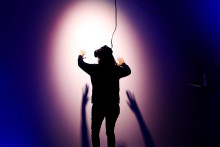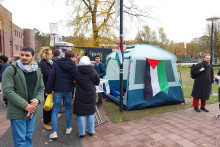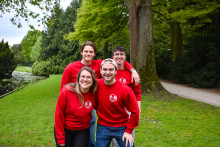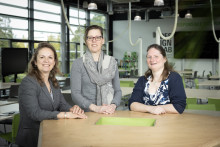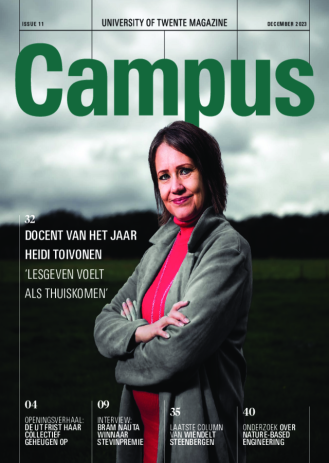reflections
Reflections is a collaboration between the University of Twente and Tetem. The exhibition is developed as part of a research project by UT scientist Mieke Boon (professor of Philosophy of Science in Practice), together with students of the Master’s program Philosophy of Science, Technology and Society and the Bachelor’s program ATLAS.
The exhibit was originally planned to open in April, but had to be postponed due to the coronavirus pandemic. It will now be available from the 10th of September until the 16th of October. You can visit Reflections in person, but the exhibition can also be experienced digitally or via a robot on wheels provided by Tetem.
What is the main idea behind the exhibition?
Boon: ‘To create societal awareness of AI. It is called ‘Reflections’ for a reason. We invite people to reflect on AI in society. In the past years, I became interested in artificial intelligence in my philosophical research. AI is becoming better and better and it could soon take over many cognitive functions. It might know us better than we know ourselves. It can make decisions on which music we should listen to, which job to take, which partner to marry and so on. How will that make us feel? What will it do to human dignity? I wanted to explore these questions. In October 2019 I started working on these topics together with my students and Tetem with the goal of creating this philosophical exhibition.’
What can visitors expect from Reflections?
‘We have created eight interactive installations, each one covering a different theme related to AI. We had to change it up to make the exhibit corona proof. Now every visitor gets a tablet through which they can control the installation. After each interaction, they also receive reflection questions and at the last installation they can see their replies, as well as statistics of answers from other visitors.’
Will you use these results for your research as well?
‘It would be great to collect the visitors’ reflections. It could help us see how the general public thinks of AI. However, we are not sure yet whether this is feasible in light of the privacy laws. As part of the exhibition, we have created an e-book that gives an overview of the installations and our ideas behind them.’
What do you hope people take away from the exhibition?
‘I hope they can learn to ask questions on what it means to be human and get a better understanding of what AI is. The whole exhibition is set up as a story line. You begin with installation called ‘Look’, which asks you to reflect on how you see yourself. Will AI change how we see ourselves? In other installations, you experience AI applications that already exist, learn about the role of human intelligence that goes into the creation of AI, and play around with computer models. Thanks to collaboration with the BMS Lab, you also get to experience virtual reality and augmented reality, both of which use AI. We truly hope the exhibition will also be visited by scientists, professionals and officials working with AI. I want people to understand what AI means in our society.’
Why is that so important for you?
‘We need to create awareness for two reasons. First, I am concerned that people will trust and use AI in the sense that AI will tell them who they are; that people will become robots controlled by apps. It is crucial for humanity to not let this happen. Secondly, it’s important for society in general. The arms race among countries used to be focused on military weaponry. Now it is about AI. Countries feel they need to be ahead in AI development in order to ensure economic wellbeing and good future. But at the moment, investments to this end are mainly used for the development of AI applications, with little attention to creating social awareness and investigating possible consequences for humanity.’


